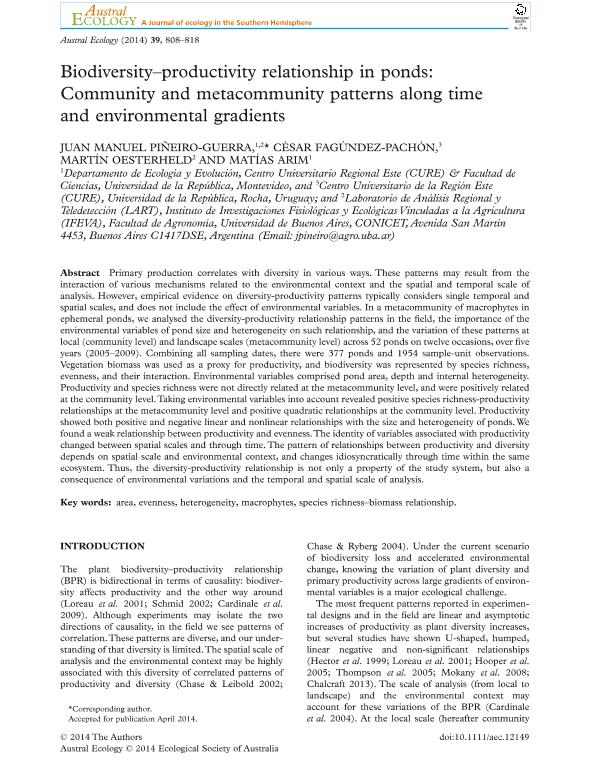Mostrar el registro sencillo del ítem
dc.contributor.author
Piñeiro Guerra, Juan Manuel

dc.contributor.author
Fagúndez Pachón, César
dc.contributor.author
Oesterheld, Martin

dc.contributor.author
Arim, Matías
dc.date.available
2016-02-17T20:49:26Z
dc.date.issued
2014-05
dc.identifier.citation
Piñeiro Guerra, Juan Manuel; Fagúndez Pachón, César; Oesterheld, Martin; Arim, Matías; Biodiversity-productivity relationship in ponds: Community and metacommunity patterns along time and environmental gradients; Wiley; Austral Ecology; 39; 7; 5-2014; 808-818
dc.identifier.issn
1442-9985
dc.identifier.uri
http://hdl.handle.net/11336/4241
dc.description.abstract
Primary production correlates with diversity in various ways. These patterns may result from the interaction of various mechanisms related to the environmental context and the spatial and temporal scale of analysis. However, empirical evidence on diversity-productivity patterns typically considers single temporal and spatial scales, and does not include the effect of environmental variables. In a metacommunity of macrophytes in ephemeral ponds, we analysed the diversity-productivity relationship patterns in the field, the importance of the environmental variables of pond size and heterogeneity on such relationship, and the variation of these patterns at local (community level) and landscape scales (metacommunity level) across 52 ponds on twelve occasions, over five years (2005?2009). Combining all sampling dates, there were 377 ponds and 1954 sample-unit observations.Vegetation biomass was used as a proxy for productivity, and biodiversity was represented by species richness,evenness, and their interaction. Environmental variables comprised pond area, depth and internal heterogeneity. Productivity and species richness were not directly related at the metacommunity level, and were positively related at the community level.Taking environmental variables into account revealed positive species richness-productivity relationships at the metacommunity level and positive quadratic relationships at the community level. Productivity showed both positive and negative linear and nonlinear relationships with the size and heterogeneity of ponds.We found a weak relationship between productivity and evenness.The identity of variables associated with productivity changed between spatial scales and through time. The pattern of relationships between productivity and diversity depends on spatial scale and environmental context, and changes idiosyncratically through time within the same ecosystem. Thus, the diversity-productivity relationship is not only a property of the study system, but also a consequence of environmental variations and the temporal and spatial scale of analysis.
dc.format
application/pdf
dc.language.iso
eng
dc.publisher
Wiley

dc.rights
info:eu-repo/semantics/openAccess
dc.rights.uri
https://creativecommons.org/licenses/by-nc-sa/2.5/ar/
dc.subject
Area
dc.subject
Eveness
dc.subject
Heterogeneity
dc.subject
Macrophytes
dc.subject
Species Richness-Biomass Relationship
dc.subject.classification
Ecología

dc.subject.classification
Ciencias Biológicas

dc.subject.classification
CIENCIAS NATURALES Y EXACTAS

dc.title
Biodiversity-productivity relationship in ponds: Community and metacommunity patterns along time and environmental gradients
dc.type
info:eu-repo/semantics/article
dc.type
info:ar-repo/semantics/artículo
dc.type
info:eu-repo/semantics/publishedVersion
dc.date.updated
2016-03-30 10:35:44.97925-03
dc.journal.volume
39
dc.journal.number
7
dc.journal.pagination
808-818
dc.journal.pais
Estados Unidos

dc.journal.ciudad
Hoboken
dc.description.fil
Fil: Piñeiro Guerra, Juan Manuel. Consejo Nacional de Investigaciones Científicas y Técnicas. Oficina de Coordinación Administrativa Parque Centenario. Instituto de Investigaciones Fisiológicas y Ecológicas Vinculadas a la Agricultura; Argentina. Universidad de la República. Facultad de Ciencias. Centro Universitario Regional Este. Departamento de Ecología y Evolución; Uruguay
dc.description.fil
Fil: Fagúndez Pachón, César. Universidad de la República. Centro Universitario Regional Este; Uruguay
dc.description.fil
Fil: Oesterheld, Martin. Consejo Nacional de Investigaciones Científicas y Técnicas. Oficina de Coordinación Administrativa Parque Centenario. Instituto de Investigaciones Fisiológicas y Ecológicas Vinculadas a la Agricultura; Argentina
dc.description.fil
Fil: Arim, Matías. Universidad de la República. Facultad de Ciencias. Centro Universitario Regional Este. Departamento de Ecología y Evolución; Uruguay
dc.journal.title
Austral Ecology

dc.relation.alternativeid
info:eu-repo/semantics/altIdentifier/url/http://onlinelibrary.wiley.com/doi/10.1111/aec.12149/abstract
dc.relation.alternativeid
info:eu-repo/semantics/altIdentifier/doi/http://dx.doi.org/DOI:10.1111/aec.12149
dc.relation.alternativeid
info:eu-repo/semantics/altIdentifier/issn/1442-9985
Archivos asociados
